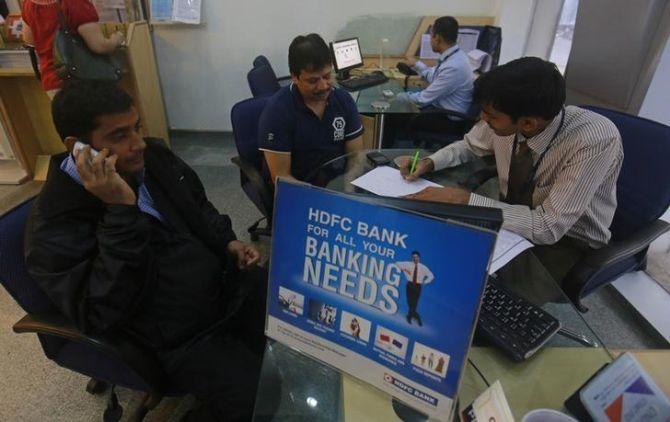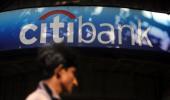HDFC and HDFC Bank’s merger – touted as India's biggest-ever corporate merger – pumped up shares of the two entities on the bourses.

Shares of Housing Finance Development Corporation (HDFC) skyrocketed 9 per cent while those of HDFC Bank zoomed 10 per cent.
In comparison, the benchmark S&P BSESensex and the Nifty50 indices settled 2.2 per cent higher on Monday.
However, analysts say investors need to "tame down” their enthusiasm as the merger might hit regulatory road block, if the Reserve Bank of India (RBI) has its way.
Taking cues from the Axis Bank-Max Financial deal, analysts say the banking regulator did not allow the former to single-handedly own a significant stake in the life insurance firm.
This precedent, they believe, could prove to be true for the HDFC – HDFC Bank merger as well.
"Given that HDFC already owns nearly 48 per cent stake in HDFC Life, the combined entity is expected to own a bigger share.
"Even if HDFC-HDFC Bank decide to pare their stake over the next 15-18 months, investors need to see whether or not the market has the capacity to absorb such a heavy supply of HDFC Life’s shares," said Ajay Bodke, an independent market analyst.
Back in 2020, the RBI had rejected Axis Bank’s request to directly acquire a stake in Max Life Insurance.
The private lender was asked to purchase up to 19 per cent stake in Max Life along with its subsidiaries Axis Capital Limited and Axis Securities Limited.
The current regulation permits banks to hold up to 50 per cent stakes in insurers and on a selective basis equity holdings can be higher but must eventually be brought down within a certain period.
However, the RBI has proposed to limit banks' ownership stake in non-core businesses at 20 per cent.
"RBI's approval will be one of the key monitorables for the deal, as the bank will end up owning 48 per cent in HDFC Life, around 50 per cent in the general insurance, and 69 per cent in the AMC entities of the group.
"Very recently, RBI did not allow Axis Bank to directly own more than 10 per cent in Max Life, and ICICI Bank also was asked to bring down shareholding in ICICI Lombard to less than 30 per cent," noted analysts at global brokerage Macquarie.
Foreign investors' stake
That said, analysts said investors also need to watch out how much foreign investors’ money will actually flow in the merged entity, and if that will result in any pare down in stake by domestic mutual funds.
"Domestic mutual funds can hold 10 per cent of their entire corpus in a single entity.
"However, the merged entity will see that percentage threshold being breached.
"Given this, how much of the stake will MFs pare in them, and will the FPI inflow be enough to offset this trimming is something that investors need to watch," said Bodke.
According to the combined statement issued by HDFC Bank and HDFC, the merger gives 7 per cent headroom for FPI holding post the merger as Treasury stock will get cancelled.
What's in store for retail investors?
According to the contours of the deal, shareholders of HDFC Ltd will receive 42 shares of HDFC Bank for 25 shares held.
Shares held by the housing finance company in the lender will be extinguished, making HDFC Bank a full-fledged public company.
G Chokkalingam, founder and CIO at Equinomics Research suggests investors should not jump in to buy either of these stocks right now, but use the intermittent market corrections to add to their position.
Analysts at Macquarie also warn against near-term hit on the bank's profitability.
"HDFC Bank will have an excess statutory liquidity ratio (SLR) and cash reserve ratio (CRR) asset requirement of Rs 70,000-80,000 crore and will also need an incremental Rs 90,000 crore agriculture portfolio to meet priority sector lending (PSL) norms.
"These low-yielding portfolios could be a drag on the merged entity's profitability," they said.
ICICI had undergone a similar group merger in 2002. The current account-saving account (CASA) for ICICI (as percentage of total funding) dropped from 26 per cent (FY01) to 9 per cent in FY03 and recovered to the 30 per cent level only by FY10.
"Refinancing HDFC Ltd’s funding with low-cost deposits will be key for success of the merger.
"HDFC Bank's effective CASA could go down to 35 per cent from 47 per cent post merger," Macquarie added.
That said, analysts expect HDFC Bank to enjoy improved housing loan portfolio, better capital buffer. stable net interest margin (NIMs), and higher valuation in the long-term.











